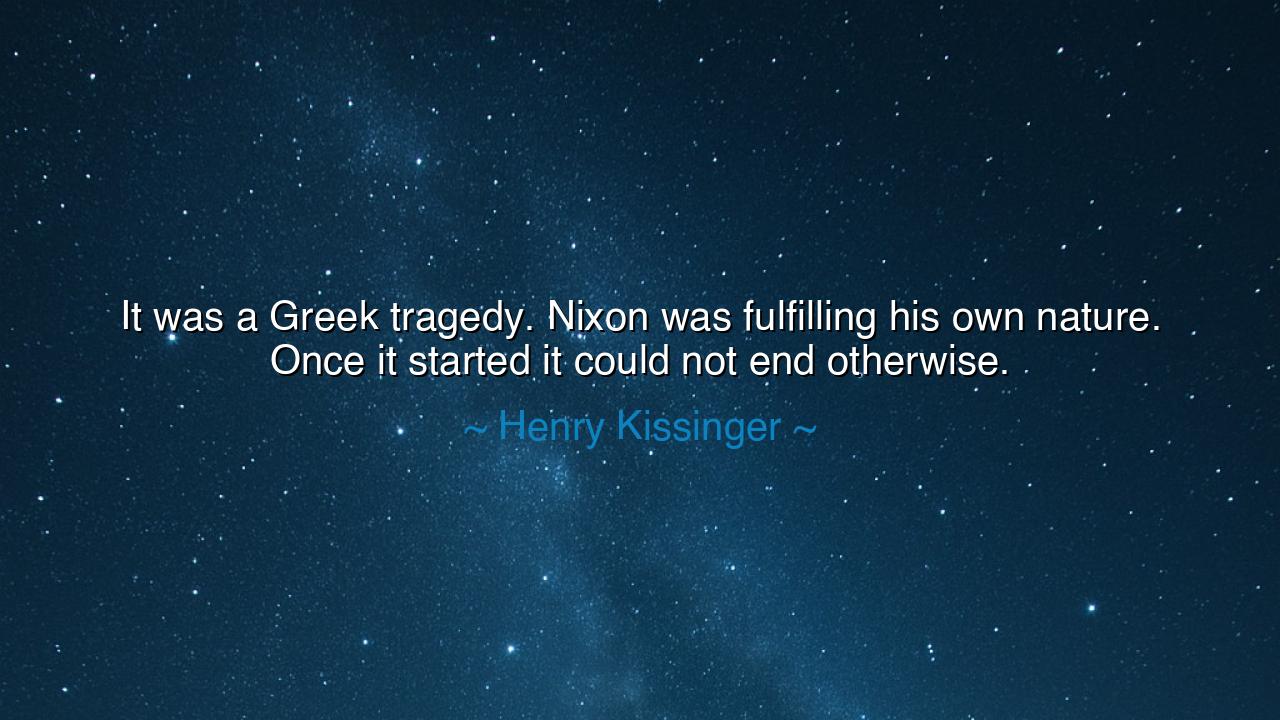
It was a Greek tragedy. Nixon was fulfilling his own nature. Once
It was a Greek tragedy. Nixon was fulfilling his own nature. Once it started it could not end otherwise.






“It was a Greek tragedy. Nixon was fulfilling his own nature. Once it started it could not end otherwise.” — So spoke Henry Kissinger, a man who had walked beside power, and seen how men, like ancient kings, fall not by the swords of others, but by the weight of their own essence. These words, though brief, resound like the echo of an oracle, reminding us that destiny is not always a matter of chance, but of character. In them lies the ancient truth that what a man is, he must one day become — that the seed of his own undoing lies hidden in his soul, waiting only for the right season to bloom.
In the old world, the Greeks believed that tragedy was not merely sorrow — it was inevitability. When Oedipus blinded himself, when Agamemnon walked the bloodied carpet, when Prometheus chained himself to the rock of defiance — each act was both their choice and their curse. They were not punished by gods, but by nature — their own inner fire, too bright to be contained. Kissinger saw this same pattern in Richard Nixon. The man who reached for greatness, who opened China and sought peace, was also the man whose suspicion and pride drove him to ruin. His fate was the mirror of his temperament — once he began his descent, no human hand could halt the motion.
There is in this reflection a lesson for every soul that yearns for power, for influence, or for mastery. Power is not a crown that makes a man divine; it is a torch that reveals what already burns within him. If that fire is pure, it lights the world. But if it is poisoned by fear or vanity, it consumes the bearer. Nixon’s Watergate was not a random downfall; it was the flowering of a long-grown root. He mistrusted the world, and so made the world mistrust him. He sought control over truth itself, and so truth rose against him — silent, implacable, inevitable.
Consider the tale of Julius Caesar, who, like Nixon, carried greatness and doom in one vessel. He conquered the world, yet could not conquer suspicion. Surrounded by honor, he feared betrayal, and by fearing it, called it forth. “Et tu, Brute?” was not only the cry of a dying man — it was the echo of his own inner voice, long ignored. So too did Nixon cry in silence, betrayed not by his enemies, but by the pattern of his own nature. The gods of Greece would have smiled knowingly, for they had seen this play before.
To understand this quote, then, is to see the cyclic law that governs both kings and commoners. What we are in spirit, we will live in flesh. The ambitious will test the heavens; the fearful will build their prisons; the proud will chase the wind and call it destiny. The tragedy is not that the end comes, but that it comes exactly as foretold — written not in the stars, but in the heart. Nixon’s tragedy was not that he fell, but that he could never have stood otherwise. His greatness and his doom were brothers, born of the same womb.
And yet, this is not a tale of despair, but of awakening. For if our nature holds our fate, then our duty is to know that nature — to master it before it masters us. The ancients called this gnōthi seauton — “Know thyself.” The man who gazes honestly into his flaws does not perish by them; he transforms them into wisdom. The man who denies them becomes their servant, walking the road of Greek tragedy, unknowing yet foredoomed. Kissinger’s words are not a lament for Nixon alone; they are a mirror for all who walk beneath the sun.
So, let this be the lesson: every choice is the unveiling of who we already are. When you act in anger, know it is your nature that speaks; when you act in virtue, it is your nature that grows. Examine your impulses as a general studies the terrain before battle — for the enemy is often within. Build the fortress of your soul upon self-knowledge, humility, and restraint. These are the shields that turn tragedy into destiny, and destiny into greatness.
And when the road darkens and the chorus of doubt begins its song, remember: even in tragedy, there is glory for the one who understands. For wisdom is not to escape one’s nature, but to fulfill it nobly. Nixon fulfilled his nature blindly, and so fell; you must fulfill yours with eyes open, and rise.






AAdministratorAdministrator
Welcome, honored guests. Please leave a comment, we will respond soon